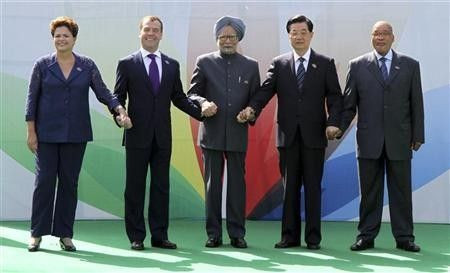China Pledges $43 Billion For Euro Zone; India And Russia, $10 Billion Each

China pledged $43 billion, while India and Russia promised $10 billion each, to the International Monetary Fund Monday as aid to debt-ridden countries in the euro zone.
World leaders meeting at a G-20 summit in Los Cabos, Mexico, voiced their concerns over the debt crisis, describing it as the single biggest risk for the world economy.
With the latest contributions from the five-nation BRICS bloc, the IMF, meant to support European nations at risk, has now doubled in lending power to reach $456 billion. These resources are being made available for crisis prevention and resolution and to meet the potential financing needs of all IMF members, said IMF Managing Director Christine Lagarde.
Announcing the decision to contribute to the IMF, Indian Prime Minister Manmohan Singh said the faltering economic recovery could adversely affect large and emerging national economies such as India and China.
I am happy to announce India has decided to contribute $10 billion to IMF's additional firewall of $430 billion, Singh said, appealing to nations with surpluses like China to follow suit, according to agency reports.
This calls for policy action on several fronts. Of greatest concern is the uncertainty affecting the euro zone. The sovereign debt crisis and the banking crisis now on the horizon have grave implications for the health of the entire global economy, he said.
The global economic situation is deeply worrying. Economic recovery is faltering, and even fast-growing, emerging markets are slowing down, he added.
Russian President Vladimir Putin also pledged a contribution of $10 billion but criticized the response to the euro zone crisis, saying that a systematic solution should be reached instead of resorting to a liquidity boost.
Singh reiterated Putin's stance, saying liquidity would not help when solvency was undermined.
To address this problem, liquidity must be provided in parallel with effective adjustment programs that ensure an early return to debt sustainability, Singh said.
Singh and Putin also met with leaders of the BRICS group, which said its money is to be used only after the current resources are substantially utilized.
These new contributions are being made in anticipation that all the reforms agreed upon in 2010 will be fully implemented in a timely manner, including a comprehensive reform of voting power and reform of quota shares, the BRICS said in a joint statement.
The contributions from the emerging economies have come at a time when the U.S. has refused to extend financial assistance.
Despite the euro zone crisis crippling the U.S. economy, Barack Obama, facing presidential election in months, is under intense political pressure at home against committing to new cash donations.
Singh addressed certain critical concerns regarding the slowdown in India's economy during the Plenary Session of the summit, saying that the government was determined to take tough decisions to reverse the expansion.
Like other countries, we too allowed the fiscal deficit to expand after 2008 to impart a stimulus. We are now focusing on reversing the expansion. This will require tough decisions, including on controlling subsidies, which we are determined to take, Singh said, addressing world leaders including President Barack Obama.
India's growth slowed to 5.3 percent, the lowest in nine years, in the fourth quarter of 2011-12. The global downturn and especially the impact on capital flows have played their part. Internal constraints have also affected performance, and we are working to correct them, Singh said.
India has set the fiscal deficit target of 5.1 percent of the GDP for this year. Lower tax revenues and poor disinvestment receipts resulted in a fiscal deficit of 5.9 percent of the GDP for last year against the target of 4.6 percent.
So far, the euro zone remains the largest contributor to the IMF fund, promising $200 billion, followed by Japan, which earlier contributed $60 billion. Britain, South Korea and Saudi Arabia have each pledged $15 billion. Singapore and several other European governments are also among smaller contributors.
© Copyright IBTimes 2025. All rights reserved.






















